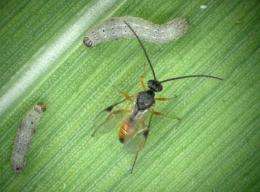Caterpillars Spodoptera littoralis with parasitic wasp Cotesia marginiventris. Credit: Matthias Held, UniNE
Insect or microbe: plants recognize their attackers and respond by producing specific internal signals that induce the appropriate chemical defenses. That is the main conclusion of a study at the Center for Medical, Agricultural and Veterinary Entomology operated at Gainesville, Florida (USA)* by USDA's Agricultural Research Service, to which the team around Prof. Ted Turlings of the University of Neuchâtel, Switzerland, has contributed. The study is published today in the prestigious journal PNAS.
When attacked, plants produce cascades of molecular reactions aimed at neutralizing their specific opponents. In response to insect attack plants produce toxins that directly affect the herbivore, but they also emit an odorous cry for help that attracts natural enemies of the pest, thus ensuring indirect protection of the plants. However, the biochemical mechanisms which trigger these defenses were poorly understood until now.
The research to which the biologists of the University of Neuchâtel contributed is directed precisely at this missing link. It has led to the identification of a peptide called ZmPep3, which maize plants produce when their leaves are eaten by herbivorous caterpillars. This peptide triggers the production of insecticidal substances, as well as the emission of a particular odor that specifically attracts natural enemies of the pest, in this case a parasitic wasp that lays its eggs in the caterpillars.
To determine the attractiveness of odorous signals, the Gainesville team turned to the Neuchâtel group of experts, known for their discovery of the cry for help in plants. "With our experiments we demonstrated that ZmPep3 is effectively the signal molecule that elicits the production of a blend of volatiles that is highly attractive for the insect-killing wasps", says Ted Turlings. The researchers further found that after treatment with a different peptide, ZmPep1, which is itself produced in response to fungal diseases, maize plants launch a specific reaction against such pathogens, but without releasing the wasp attractants. The plant therefore really does adapt its responses to the adversary that confronts it.
"A good understanding of the specific defense responses in crop plants will help scientists to select and create varieties that are particularly effective at resisting some of the most voracious pests", states the professor of the University of Neuchâtel. It may even be possible to treat plants with synthetic versions of the peptides to boost these natural defenses.
More information: Huffaker, A. et al. Plant Elicitor Peptides are Conserved Signals Regulating Direct and Indirect Anti-Herbivore Defense, PNAS, March 18, 2013. www.pnas.org/content/early/201 … /1214668110.abstract
Journal information: Proceedings of the National Academy of Sciences
Provided by University of Neuchâtel






















